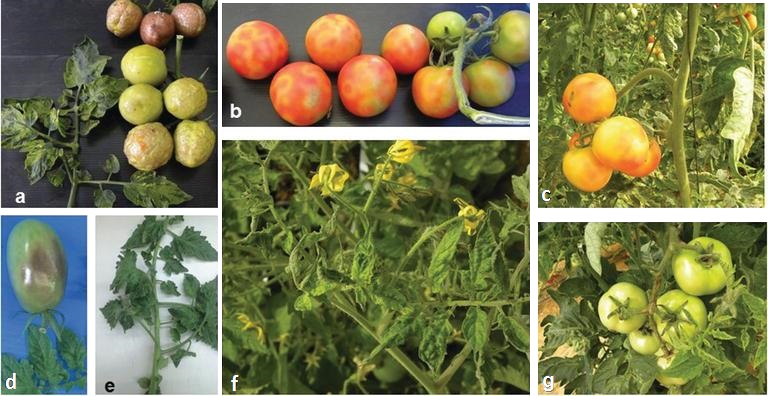Deadly Virus Has Florida Tomato Industry on High Alert

Symptoms of the ToBRFV on tomato fruit include blotched with brown necrotic spots leading to complete fruit abortion.
Photo courtesy of Seminis
The Florida Department of Agriculture and Consumer Services (FDACS) has issued a red alert after tomato brown rugose fruit virus (ToBRFV) was recently detected by local plant inspectors. The malady is highly virulent and can cause severe fruit loss in tomatoes and peppers.
According to FDACS, inspectors intercepted the ToBRFV tobamovirus from packaged Mexican tomatoes in Naples and Gainesville. These tomatoes have since been destroyed.
The virus was first found in Israel in 2014. Since then, ToBRFV has been detected in several areas, including Europe, the Middle East, and North America (Mexico and the U.S.). How ToBRFV was introduced to the U.S. and/or Mexico has not been determined, although a report from the American Phytopathogical Society outlines the results of tests in a California greenhouse in September 2018.
Imported tomatoes potentially carrying ToBRFV pose a risk to not only Florida’s fresh-market tomato supply, but also other U.S. states. The following from the FDACS-Division of Plant Industry (DPI) warns what growers should watch for.
Symptoms: Tomatoes and peppers are the two major hosts for this virus, which causes yellowing of leaf veins, and yellow spots, brown rugose (wrinkled) patches, and necrotic (dead) lesions on tomato fruit. Symptoms in fruit develop within 12 to 18 days of infection.

Tomato plants infected with tomato brown rugose fruit virus. (a, d) Brown rugose symptoms developed on fruit. (b, c) Chlorotic spots on fruit. (a, e-g) Mosaic pattern developed on leaves and narrowing accompanied by mottling leaves. (g) Necrotic symptoms on pedicle (stem), calyces, and petioles. (Source: Dombrovsky and Smith 2017 [CC BY 3.0]).
Impacts: There are no known human health impacts from ToBRFV. However, the virus can cause 30% to 70% loss of tomato yield on plants. The virus also might make infected fruit less desirable to consumers.
Prevention: Once the ToBRFV virus is introduced in an area, control measures are very limited. Prevention mainly relies on destroying infected plants and following strict decontamination measures for workers, such as sanitizing tools, frequent handwashing, and cleaning boots before entering greenhouses.
For Retailers: Grocers and retailers who suspect tomatoes in their inventories with ToBRFV infection should report the products to the FDACS-DPI at [email protected].
“For the past six months, our inspectors have been watching vigilantly for the ToBRFV virus and are moving swiftly to prevent its introduction in our state,” Florida Agriculture Commissioner Nikki Fried said. “We need the USDA to step up, initiate tracebacks to Mexican producers, and fulfill its responsibility to protect American growers and consumers.”
Michael Schadler, Executive VP of the Florida Tomato Exchange, sent out a memo to the industry on behalf of the association also urging action from the USDA regarding this new threat. A portion of the memo reads as follows: “USDA should immediately suspend the importation of tomatoes from any operation that is confirmed to have shipped infected tomatoes to the U.S. Such suspension should only be lifted after USDA can confirm that the disease has been 100% eradicated from the operation in question. USDA should also significantly ramp up inspections for the virus on all imported tomatoes and peppers.”









